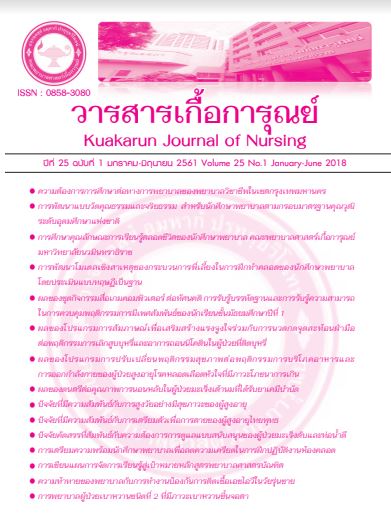ความต้องการการศึกษาต่อทางการพยาบาลของ พยาบาลวิชาชีพในเขตกรุงเทพมหานคร
คำสำคัญ:
ความต้องการการศึกษาต่อ, พยาบาลวิชาชีพ, หลักสูตรการพยาบาลเฉพาะทาง ปริญญาโทบทคัดย่อ
การวิจัยเชิงบรรยายนี้มีวัตถุประสงค์เพื่อศึกษาความต้องการการศึกษาต่อทางการ พยาบาลของพยาบาลวิชาชีพในเขตกรุงเทพมหานคร กลุ่มตัวอย่าง คือ พยาบาลวิชาชีพที่ปฏิบัติงานในโรงพยาบาลสังกัดภาครัฐ 26 แห่งและภาคเอกชน 13 แห่ง รวม 39 แห่ง สุ่มตัวอย่างแบบแบ่งชั้นภูมิตามสัดส่วนประชากร เครื่องมือวิจัย คือ แบบสอบถาม มีค่าความตรงตามเนื้อหาเท่ากับ 0.75-1.00 และค่าสัมประสิทธิ์แอลฟ่าของคอร์นบาคเท่ากับ .79 เก็บข้อมูล โดยส่งแบบสอบถาม 1,200 ฉบับทางไปรษณีย์ ได้รับการตอบกลับ 709 ฉบับ (ร้อยละ 59)
วิเคราะห์ข้อมูลโดยหาค่าความถี่และร้อยละ ผลการวิจัยพบว่า
1. พยาบาลวิชาชีพต้องการศึกษาต่อหลักสูตรปริญญาโทสาขาการพยาบาลผู้ใหญ่และ ผู้สูงอายุมากที่สุด (ร้อยละ 25) โดยด้านการจัดการเรียนการสอน ส่วนใหญ่ต้องการเรียนแผน ก คือ ทำวิทยานิพนธ์ (ร้อยละ 61.60) วันเสาร์และอาทิตย์ในเวลาปกติ (ร้อยละ 52.60) เรียนต่อเนื่องจนจบหลักสูตร (ร้อยละ 72.50) และใช้ภาษาไทยในการเรียน (ร้อยละ 64.90) ด้านเหตุผลที่ต้องการศึกษา คือ เพิ่มความรู้และประสบการณ์ (ร้อยละ 85.50) และเพิ่มวุฒิการศึกษา (ร้อยละ 54.70) ด้านแรงจูงใจต่อสถาบันที่เลือกศึกษา คือ มีหลักสูตรเป็นที่นิยมและเป็นประโยชน์ต่องานปัจจุบัน/อนาคต (ร้อยละ 92.90) และสะดวกในการเดินทาง (ร้อยละ 58.50) ด้านการสนับสนุนจากหน่วยงาน ส่วนใหญ่ให้ทุนสนับสนุน (ร้อยละ 50.80) และให้ใช้วันลาและรับเงินเดือน (ร้อยละ 79.30) และด้านสมรรถนะที่คาดหวังเมื่อจบ คือ การปฏิบัติการพยาบาล ขั้นสูง (ร้อยละ 79.40) การวิจัยและนำผลวิจัยไปใช้ (ร้อยละ 78.70) และการให้คำปรึกษา(ร้อยละ 67.60)
2. พยาบาลวิชาชีพต้องการอบรมหลักสูตรเฉพาะทางสาขาการพยาบาลเวชปฏิบัติมากที่สุด (ร้อยละ31.50) รองลงมา คือ สาขาการพยาบาลผู้สูงอายุ (ร้อยละ 29.60) โดยด้านการจัดการเรียนการสอน ส่วนใหญ่ต้องการอบรม 16-18 สัปดาห์ (ร้อยละ 94.10) วันจันทร์ถึงศุกร์ในเวลาราชการ (ร้อยละ 54.70) อบรมต่อเนื่องจนจบหลักสูตร (ร้อยละ 81.50) และใช้ภาษาไทยในการอบรม (ร้อยละ 59.10) ด้านเหตุผลที่ต้องการอบรม คือ เพิ่มความรู้และประสบการณ์ (ร้อยละ 80.80) และเพิ่มความก้าวหน้าในวิชาชีพ/การงาน (ร้อยละ 63) ด้านการสนับสนุนจากหน่วยงาน ส่วนใหญ่ให้ทุนสนับสนุน (ร้อยละ 58.10) และด้านสมรรถนะที่คาดหวังเมื่อจบ คือ การปฏิบัติการพยาบาลขั้นสูง (ร้อยละ 84.20) การให้คำปรึกษา (ร้อยละ 69.20) และการทำวิจัยและนำผลวิจัยไปใช้ (ร้อยละ 60.20) ผลการวิจัยครั้งนี้ช่วยให้คณะผู้วิจัยสามารถวางแผนจัดทำหลักสูตรใหม่ 2 หลักสูตร คือ
หลักสูตรพยาบาลศาสตรมหาบัณฑิตสาขาการพยาบาลผู้ใหญ่และผู้สูงอายุ และหลักสูตร การพยาบาลเฉพาะทางสาขาเวชปฏิบัติผู้สูงอายุ เพื่อพัฒนาสมรรถนะพยาบาลวิชาชีพให้พร้อมรับปัญหาสุขภาพของคนเมือง อันจะนำไปสู่การพัฒนาที่ยั่งยืนของพยาบาลวิชาชีพ วิชาชีพพยาบาล และโดยเฉพาะอย่างยิ่งคุณภาพชีวิตของผู้ใหญ่และผู้สูงอายุในเขตกรุงเทพมหานคร

















